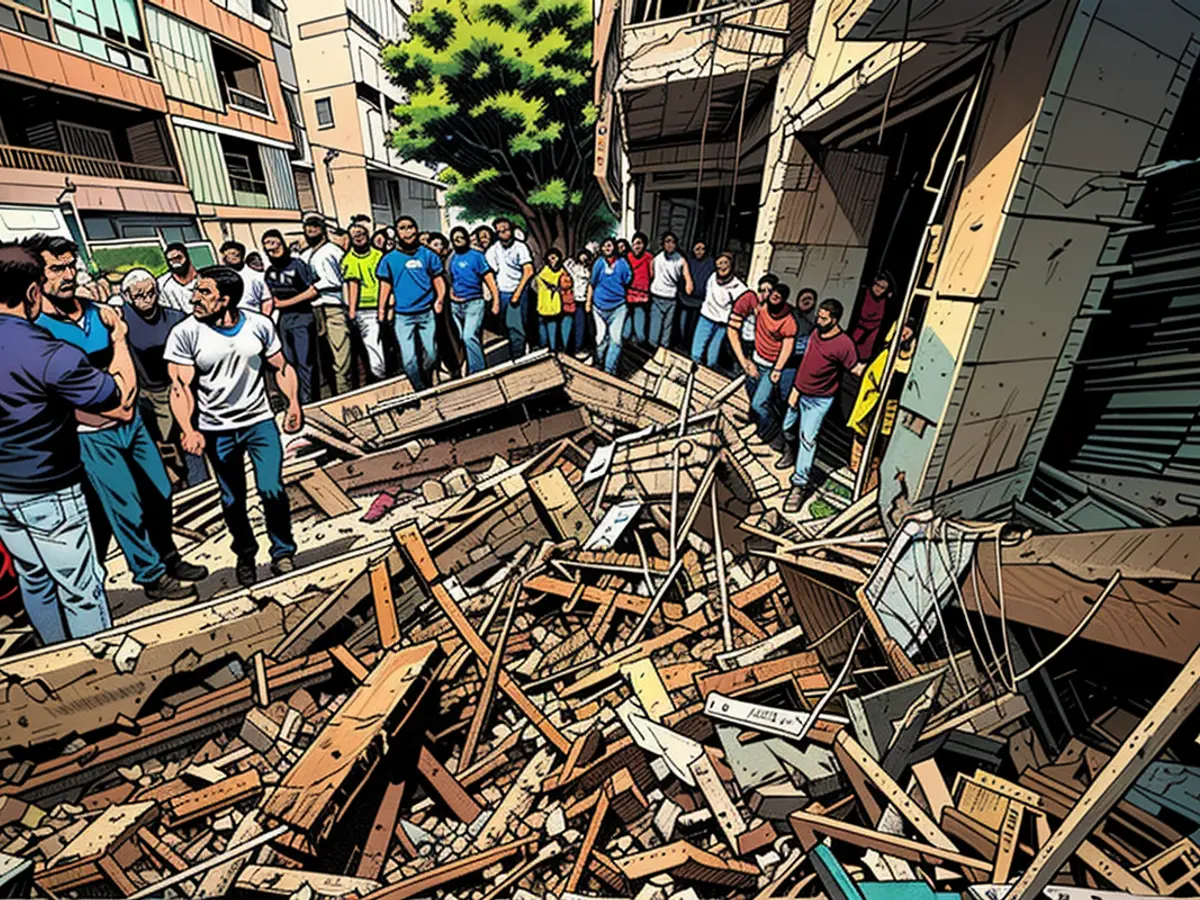In a reported incident, the Israeli defense forces announced the death of a prominent Hezbollah leader following an airstrike in Beirut.
Ibrahim Aqil, a high-ranking member of Hezbollah's Radwan Force, along with around 10 other high-ranking members, was reportedly eliminated by Israeli Defense Forces (IDF). IDF spokesperson Daniel Hagari declared that these individuals were planning an assault on communities in Galilee, northern Israel.
Hezbollah has yet to make an official statement on the matter.
Lebanon's health ministry reported that 12 people lost their lives and 59 others were injured in the aerial attack, which reduced a multi-story building in a crowded neighborhood to rubble.
According to Hagari, these targeted commanders were hiding beneath a residential building in the heart of the Dahya neighborhood, utilizing civilians as a human shield during the attack.
Aqil had a $7 million bounty placed on his head by the United States due to his suspected involvement in the 1983 US Embassy bombing in Beirut, which resulted in 63 fatalities, as well as the bombing of the Beirut Marine barracks, resulting in 241 US fatalities later that year.
CNN reporters in Beirut witnessed a flurry of activity as rescuers worked to free individuals trapped under the debris and transported the injured to hospitals. Witnesses claimed that neighboring buildings vibrated steadily for nearly half an hour following the strike, which the IDF stated occurred around 4 p.m. local time.
A string of unexpected attacks
The Friday strike marked the fourth consecutive day of unexpected attacks on Beirut and various sites across the country, with Israeli forces continuing lethal strikes and operations in Gaza and the occupied West Bank.
The first major Hezbollah assault this week occurred on Tuesday afternoon, when explosive devices detonated on the pagers of the militant group's members practically simultaneously. These pagers were utilized by Hezbollah for communication following a call from the group's leader, Hassan Nasrallah, urging members to switch to low-tech devices to prevent further assassinations.

Just 24 hours later, Lebanon was rocked by a second wave of explosions after Hezbollah walkie-talkies detonated in Beirut and the southern part of the country on Wednesday.
A total of 37 individuals lost their lives, including children, and more than 3,000 were injured in the twin attacks.
Israel initially refused to comment on the Tuesday pager explosions but acknowledged its role in the attacks on Wednesday. Defense Minister Yoav Gallant praised the "outstanding achievements" of the IDF, in conjunction with the country's security agency, the Shin Bet, and its intelligence agency, Mossad.
Gallant remarked that a "new era" of war had begun, and Israel targeted Beirut for a third time on Thursday, deploying jets and dropping flares over the city while Nasrallah delivered a speech promising retribution. Later, Israel launched one of its most intense bombardments against Hezbollah targets in Lebanon in nearly a year of cross-border strikes, stating that it destroyed approximately 100 Hezbollah rocket launchers.
The Friday airstrike on Beirut marked the third such attack on Beirut since hostilities commenced last year, following Hamas' October 7 attack on Israel. In January, an Israeli airstrike claimed the life of Saleh Al-Arouri, deputy head of Hamas' military wing, who had been residing in Beirut. In July, a second Israeli strike on Beirut resulted in the death of Hezbollah's most senior military official, Fu'ad Shukr.
Before the surprise attacks on Lebanon, Israel's security council voted to incorporate a new objective into its ongoing conflict with Hamas and Hezbollah: ensuring the safe return of residents from communities along its northern border with Lebanon to their homes.
After nearly a year of cross-border interactions between Hezbollah and Israel, tens of thousands of people have been displaced from their homes in both southern Lebanon and northern Israel. While the return of northern Israeli residents has long been viewed as a political necessity for Prime Minister Benjamin Netanyahu's government, this is the first time it has been officially established as a war goal.
As ambulances and fire trucks converged on the scene in southern Beirut, CNN's team on the ground observed a car hastily departing with suitcases strapped to it, yet another manifestation of the trepidation and panic gripping Lebanese civilians following days of blasts and now airstrikes.

The world is watching as tensions between Israel and Hezbollah continue to escalate, with multiple unexpected attacks occurring in Beirut and other parts of Lebanon.
These unprecedented attacks have resulted in the loss of numerous lives and displacement of thousands of civilians in both Lebanon and Israel, highlighting the seriousness and potential global implications of the conflict.







